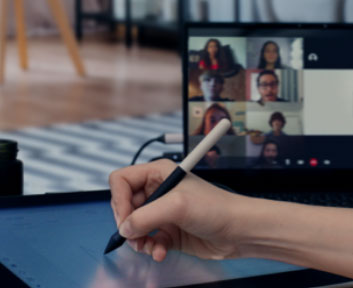
Wacom Experience Center - A space for everyone to be creative
The Wacom Experience Center Portland was founded for the purpose of creating a space where people could interact with the local creative community. The Center was built based on our passion for "creating a place where everyone is welcome to express their creativity". It has been attracting a wide range of people, from up-and-coming artists to internationally active creators, all with “creativity” as their focus.
What does the Experience Center mean to Portland's creative community and Wacom? We will introduce the path it has taken in a talk with Megan Davis, who has been playing an energetic role in this space since its launch in 2016.
Could you tell us about the Wacom Experience Center in Portland?
Megan:The Wacom Experience Center in Portland (referred to as the Experience Center) is a space for the creative community in Portland, USA to create connections. We host a variety of events, workshops, and lectures in a space that can accommodate about 100 people.
The Experience Center opened in 2016 as a space to engage with customers and creatives in the local community. Our mission is to foster creativity and innovative ideas, while inspiring those around us.
The Experience Center has grown organically since its inception in 2016. How have you expanded the scope?
Megan: I started by sharing the vision and concept with people close to me. Drawing on my previous experience of working at an art school and being part of the local creative community as a creator myself, I first reached out to friends, acquaintances, and students involved in animation, design, comics, and game development. They were also Wacom users, so it didn't take long for them to understand the potential the Experience Center could offer. It was a process of trial and error, but as the community gradually became familiar with our name and mission, we were able to expand and reach even deeper into the creative and tech communities.
The quality of speakers and presenters were also a key factor in its success. We invited a lot of talented people, including a world-renowned film producer as well as a footwear designer. As people have become increasingly aware of the potential the Experience Center has to offer, more people have started participating and coming to our space.
We've had some very tangible success on the road to supporting and fostering our community. One of them being that we've been able to support other creative outlets such as a local theater as well as startups in and around Portland over the last few years. I believe that through our continued efforts, we are creating a meaningful and credible reputation as one of the leading supporters in the creative and tech communities.
It takes a lot of energy to start a project from scratch. How did you reach this point?
Megan: We wanted to create a space where all kinds of people are welcome. It's a showroom, it's a creative workspace, and it's a place where we support people to make what they believe in. Portland's creative community is open to all kinds of people, and there is a spirit of mentorship that supports the growth of young creators. We thought that if there was a space here that could serve as a beacon, it would bring people together in an organic way.
Wacom is a digital technology company, but we also welcome people who want to create using any medium they want. The Experience Center is a space for all kinds of people, so we support every type of creation with whatever tools we have available. We can introduce Wacom products as new tools, but that is not always our main focus. Our goal is to make sure that we are supporting our creatives in a way that is authentic to their craft, medium, and process. This requires a unique understanding of the overall creative process, which I feel myself and my team are always able to do.
Would you say that Portland is a town that means a lot to the creative community?
Megan: Portland is a small, big town if that makes sense. There are so many industries that foster and require creativity. I think it's easier for creatives to feel like they can carve out a piece of wherever they are if a place has that small-town vibe. The feeling of a big city can often be overwhelming. People may not believe it but it’s a very hard life being creative. We're all very anxious and sensitive. I think it's important to be able to feel you have a piece of this town that you can call your own and feel comfortable in. But it's not huge enough that it's overwhelming.
There are many initiatives that the Experience Center has put into motion. What ones stand out as particularly memorable in your opinion?
Megan: One is Sneaker Week, which we launched in 2016 with a local footwear design school called PENSOLE ACADEMY. Sneaker Week is a festival designed to connect Portland's sneaker community with the footwear industry. Each year, we host lectures and design workshops with footwear designers and leaders in the industry to engage the creative community and those interested in technology and innovation.
Aspiring footwear designers typically study industrial design, which is not necessarily industry-specific. Pensole was starting to fill that gap by focusing on footwear industry-specific education. As a big sneakerhead, I immediately hit it off with Pensole's marketing manager and came up with the idea for Sneaker Week. Portland is home to many well-known footwear brands. It's also a city that loves to be unique, and with so many cool festivals like Pizza Week, Donut Week, and Burger Week, there was no reason not to celebrate Sneaker Week. What started as a small, invite-only event, is now one of the largest festivals in Portland.
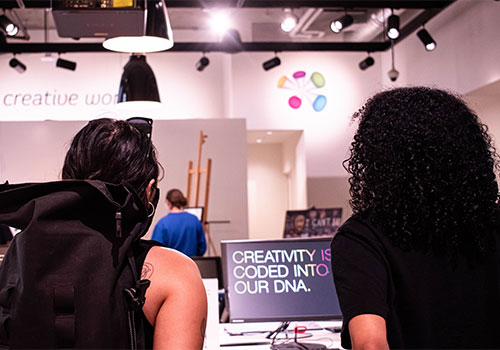
Another one is a comic convention in Portland called "Rose City Comic Con". As an Experience Center, we have been participating in this event for the past eight years, supporting up-and-coming artists by setting up a stage in an area called Artist Alley. Generally, Artist Alley is where independent artists sell their work and where well-known artists give demos and talks. Up-and-coming artists use the area outside of this space, but it can be difficult to get attention here. Often no one showed up even though the artists and facilitators organized this extra area. So we set up a stage in the middle of Artist Alley where small local artists could talk about their work and give demos too. It has the added benefit of keeping people on the exhibitor floor, which in turn gives the artists more support because the longer people stay, the more they are likely to buy some art.
Why is community important to Wacom and to the Experience Center?
Megan: I think the phrase "Think global, act local" sums up the significance of what community stands for. Now that anyone can communicate from anywhere there is so much we can do – the possibilities are basically endless. It's difficult to make a global impact if you or your local community don’t feel supported or have safe spaces to create and innovate. At the Experience Center, we have both online and in-person events, and we aim to strike a balance between the two. While our online events in particular provide opportunities to interact with many people beyond the Portland area, the heart of what we do is to support Portland's creative community. We are working to make sure that creators here in Portland feel that there is a place where they can talk about their work and feel supported. This gives them a base from which they can go out beyond the boundaries of Portland and share their experiences, skills and insights with the greater global community.
The world would be a very sad place without creators. Creativity is important to our daily lives, and if we could hypothetically tell one person, "That's a great piece of work," we might be able to encourage them to keep going. We want to deepen our connection with the local community and continue to be an inspiration to people everywhere around the globe to keep creating.
At the Experience Center, events and community interaction is happening on a daily basis. What do you think is the driving force behind what you do, despite the challenges of preparing and managing the space?
Megan: It’s insane (laughs)! I have a wonderful team that I work with. They are the reason we can do all the things I've talked about.
And most of all, I love watching the people that come to the Experience Center and witnessing the synergy that happens there. It's inspiring and moving to watch someone use the tools, resources, and access we offer to create something. The other day, we had a Game Jam event that brought nearly 50 people together. It was an event where people teamed up for the first time to create a video game within two weeks with people they had never met before. This super unique group of people was like “Hey, I like your shirt. Do you want to make a video game together?” and they would say, “That sounds great.” And that’s how they started making video games. I think the most attractive thing about working at Wacom is being able to encounter moments like that and being part of this kind of creative community.
In 2021, we opened our second Experience Center in Düsseldorf, Germany. I believe that we’re able to duplicate the concept in Dusseldorf thanks to the success we’ve already had in Portland. My true goal is to continue to broaden our reach and have more Wacom Experience Centers all over the world.
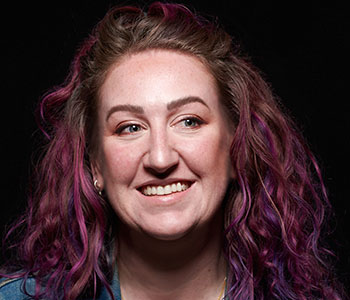
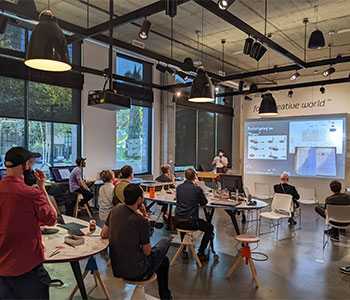

Reflecting on the Last Five Years: Progress and Future Trajectories of Social Initiatives
We will reflect upon our five-year journey with CEO Nobu Ide about the intention to connect the future of Social Initiatives with our Meaningful Growth.

Our Sparks. “Focus: The Autistic Superhero Loves Comic Art!” by Yvonne Wan
Discover the inspiring works of community creators who collaborate with us. Today, we feature “Focus: The Autistic Superhero Loves Comic Art!” by Yvonne Wan.

"CREATE Program" Expanding Future Possibilities and Connecting Hopes
Wacom Canada has been involved with the "CREATE Program" at Sisler High School as a partner to support students who want to embark on career paths in the creative industry.

Our Sparks. “Join The Journey” by Arian Rahmatzai
The 'Our Sparks.' pages showcases community creators whose works inspire and collaborate with us. This time features Arian Rahmatzai's artwork, a German talent who interned at Wacom.
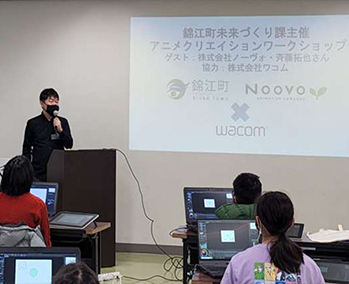
Supporting Children's Dreams of Becoming Creators - 1: Initiatives with Kinko Town
The aspiration of children who dream of becoming creators is what ignites our team members’ enthusiasm and drives many of our initiatives. One such initiative involved teaming up with an animation workshop in Kinko Town, Kagoshima Prefecture, Japan.
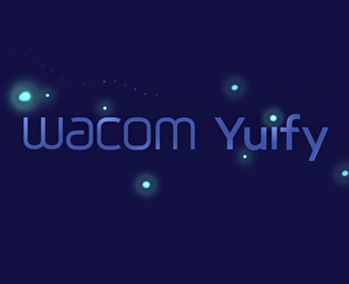
Wacom Yuify: Making the world a safer place for creators
Wacom Yuify is an innovative service being developed to authenticate creators' works by embedding invisible micro-marks into artworks and, therefore, addressing unique needs across various regions and cultures.
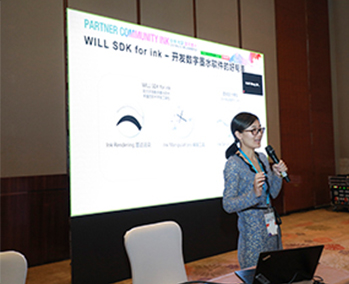
Initiatives in China – Bringing Digital Ink Technology to More People
Lannie Zhang, the only product manager in the Ink Division in China, took the time to talk to us about the initiatives planned to increase awareness and promote the use of digital ink technology.

Our Sparks. “At the beach in the early afternoon” by sammy
We would like to introduce the artworks by artists in Oiso Town, Kanagawa, Japan, where we have been working together to support the writing/drawing initiative.
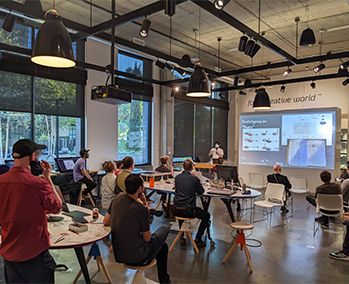
Wacom Experience Center - A space for everyone to be creative
The Wacom Experience Center Portland was created for people to interact with the creative community in the city. We took a look back at its growth with Megan Davis, who has been playing an energetic role there.
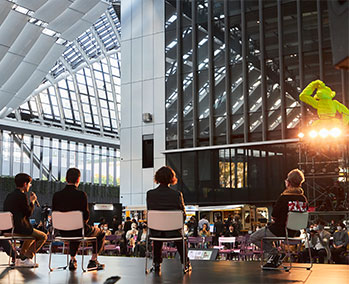
Connected Ink 2022: What happens here is everything
Connected Ink 2022 opened with two key questions. Let’s take a look back at some of the sessions in Tokyo that explored them.
Read More
Our Sparks. “Wind Carrying Light” by Syuro
We would like to introduce the artworks by artists in Oiso Town, Kanagawa, Japan, where we have been working together to support the writing/drawing initiative.
Read More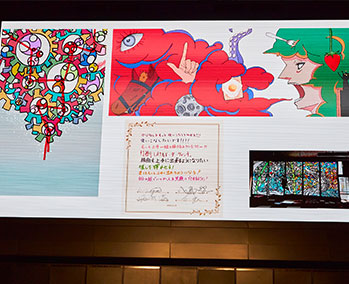
How can we support the “writing/drawing" initiative with Oiso Town?
The partnership with Oiso Town has developed into a city-wide initiative. We spoke with Tadakuni Tsubota of the Creative BU Retail Partnership about this initiative.
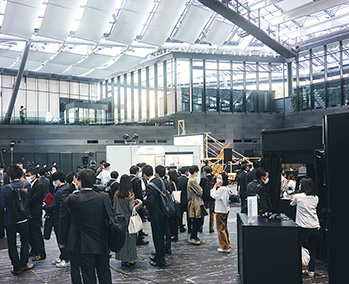
A side of the Connected Ink polyhedron - 2
How do team members see Connected Ink? The next team member is Yohei Himori who is involved in the planning and operation of Connected Ink together with Heidi.
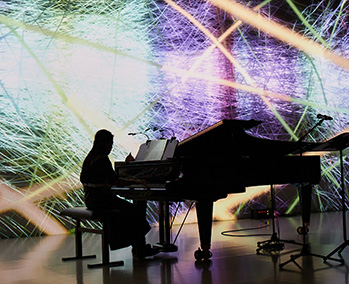
A side of the Connected Ink polyhedron - 1
How do team members see Connected Ink? The first team member is Heidi Wang who has played a key role in the planning and operations when it all began in 2016.
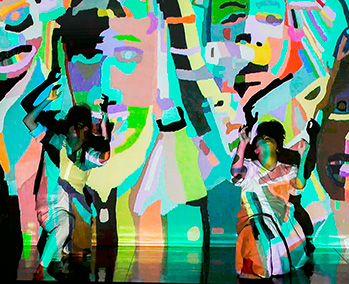
How can we overcome barriers that exist in society? / Call & Response
In collaboration with Heralbony Inc. and the General Incorporated Association, Connected Ink Village, Wacom launched a new initiative called "Call & Response” in September 2021.
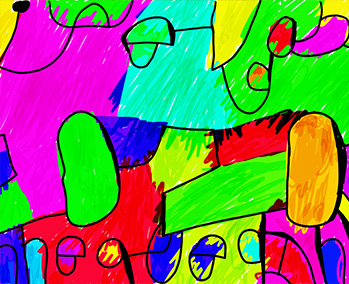
What Lingers in the Afterglow / Connected Ink 2021
Here’s a look back at the opening and finale of the nearly 70 sessions held that day and reflect upon what has happened since Connected Ink 2021.
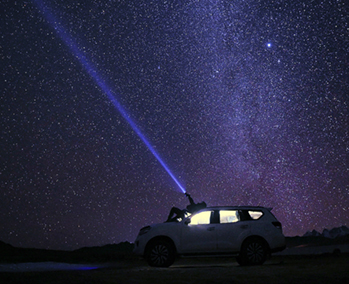
Our Sparks.
“The spark of love” by Jacky Yang
Our sparks meet constantly changing situations, unexpected challenges, and new opportunities. We called on our team members again to show how they see their spark in the world of today and the future.
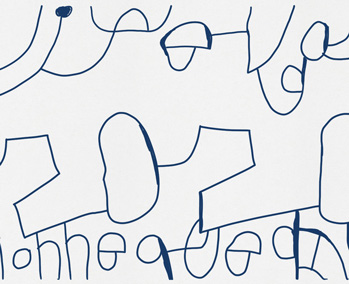
Keep asking questions and moving forward / Connected Ink 2020
Connected Ink 2020 was the beginning of a new commitment and challenge for Wacom to continue asking those eternal questions that always play in our minds.
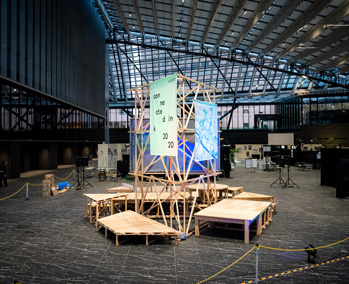
“Stage KOPPA”, a stage that connects stories
"Stage KOPPA" was created as a stage for Connected Ink 2020. It is a stage that changes its shape and role in response to different situations while connecting the various stories that occur there.

Our Sparks.
“Mam and Dad’s Child Interest” by Stella Wang
“Mam and Dad’s Child Interest” by Stella Wang
Our sparks meet constantly changing situations, unexpected challenges, and new opportunities. We called on our team members again to show how they see their spark in the world of today and the future.
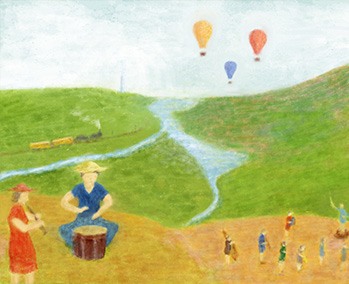
Our Sparks.
"A moment on an autumn mountain" by Takahiro Yamamoto
"A moment on an autumn mountain" by Takahiro Yamamoto
We had an internal art contest for our Social Initiatives. Let us share the existence of the spark in our team members’ hearts with their artworks.
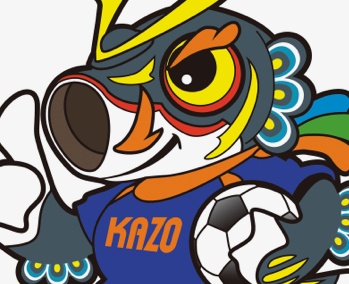
Online drawing class for elementary school students during stay-at-home period
Yoshinori Mita, a team member of Japan held an online drawing class together with FC KAZO and illustrator Suiiro to provide something fun for elementary school children to do during the COVID-19 stay-at-home period.
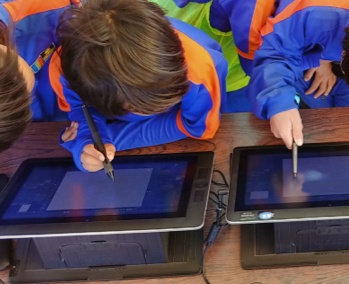
Wacom's new initiative through soccer
As an official partner, Wacom supports FC KAZO, a soccer club in Kazo City, Saitama Prefecture, Japan. We’re excited to introduce our new initiatives with this inspiring club.
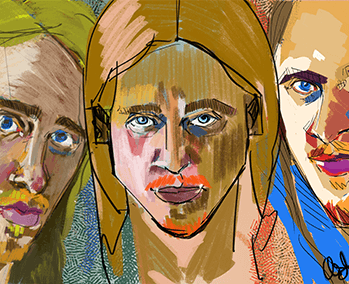
Our Sparks.
"The spark is in you! Mirror portraits during times of isolation" by Oliver Madlener
"The spark is in you! Mirror portraits during times of isolation" by Oliver Madlener
We had an internal art contest for our Social Initiatives. Let us share the existence of the spark in our team members’ hearts with their artworks.
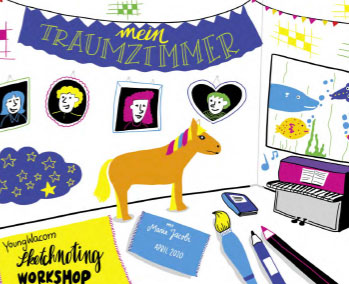
Online Sketchnoting workshop for children during school closures
Our team members in Germany organized an online workshop “Young Wacom” for the children while schools were closed due to the COVID-19 pandemic.
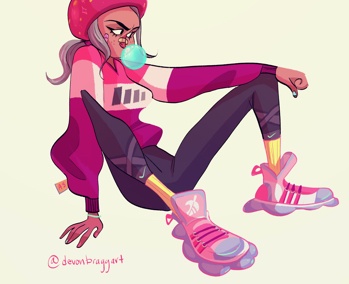
Support the "lives" of artists through customer support
Alex Duffey from our Americas Support team established a new program to support artists. We asked him about a story with Ms. Devon Bragg, the artist who inspired him to establish this program.
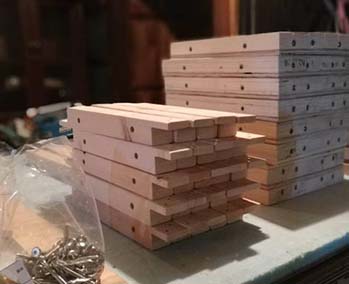
3. How KOPPA began /
The story of the Traveling KOPPA
The story of the Traveling KOPPA
KOPPA began in April 2019. Tamotsu wanted to make something that can be used again after an exhibition. We asked Team KOPPA about their thoughts.
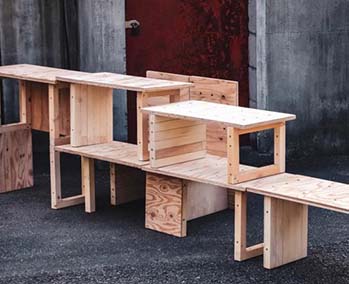
2. No need to destroy it anymore /
The story of the Traveling KOPPA
The story of the Traveling KOPPA
We put it together ourselves, set it up, put it back, then travel together again. The Traveling KOPPA, our new display furniture came to be.
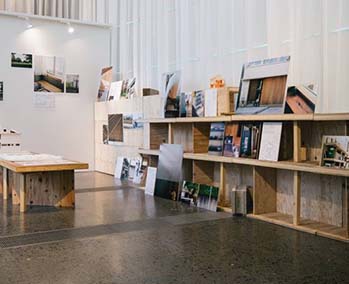
1.Meeting KOPPA /
The story of the Traveling KOPPA
The story of the Traveling KOPPA
KOPPA started out as a challenge: Tamotsu Ito, an architect from Japan, wanted to utilize leftover building materials. Our meeting was pure happenstance.

Our Sparks.
“That Spark Inside” by Simone Wolters
“That Spark Inside” by Simone Wolters
We had an internal art contest for our Social Initiatives. Let us share the existence of the spark in our team members’ hearts with their artworks.
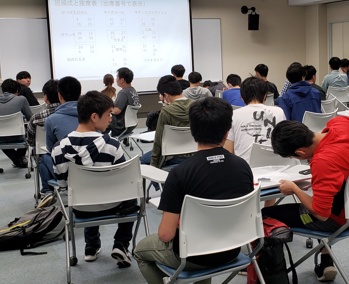
Marketing lecture for future engineers
We gave a marketing lecture for students who are learning to be engineers at the National Institute of Technology Tokyo College.
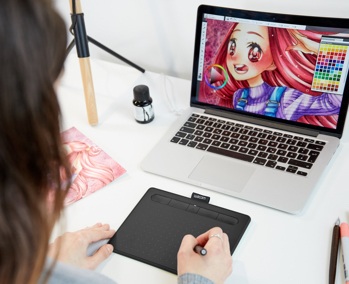
Efforts by our sales member, who are responsible for a pen tablet until the very end
Every year, we take pen tablets that have been sitting in our warehouse and gift them to high school clubs and winners of high school art competitions to help students create digital contents.
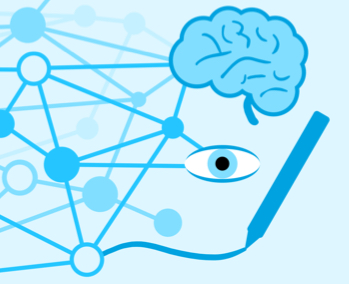
For the Future of Education
Lifelong Ink x AI
Lifelong Ink x AI
"AI Ink for Education" was developed to capture eye movement information and pen movements while learning, in order to ascertain the characteristics of learning by each student and to create an educational environment suited to each student.
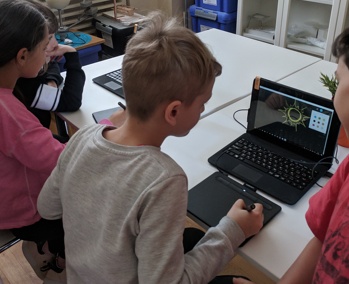
Wacom Intuos have been introduced in a school to make classes more fun and creative
Yoana Simeonova, a software designer working in Bulgaria, introduced Wacom Intuos in a school to make children's IT classes more fun.
























